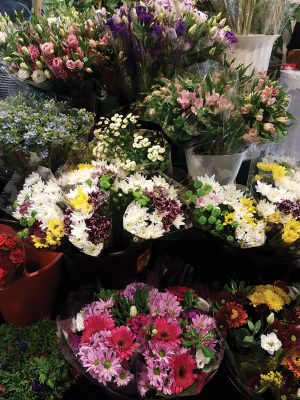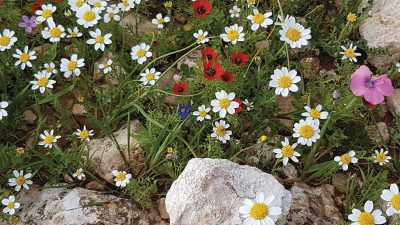
by: Janet Aslin, BFP Staff Writer
 Fridays bring many visible clues to announce the arrival of Shabbat (Sabbath) in Jerusalem. The city begins to slow down, delicious cooking odors greet pedestrians as they walk through residential areas and colorful flower stalls appear everywhere—at intersections, on sidewalks, outside small grocery stores and at the shuk (outdoor market).
Fridays bring many visible clues to announce the arrival of Shabbat (Sabbath) in Jerusalem. The city begins to slow down, delicious cooking odors greet pedestrians as they walk through residential areas and colorful flower stalls appear everywhere—at intersections, on sidewalks, outside small grocery stores and at the shuk (outdoor market).
Buying flowers for Shabbat isn’t just a regular purchase—it’s part of the preparation. Husbands and dinner guests alike stop to buy a perfect bouquet of cut flowers to grace the table that evening. Bouquets are arranged in buckets by price, which range from NIS 20 shekels to NIS 50 shekels (US $5 to $15). Because many of the stalls are located at bus stops, it is easy for commuters to zip in quickly, make a selection and be on their way without disrupting other traffic along the busy roads.
One possible origin of the tradition of bringing cut flowers to dinner is the special place Shabbat has in Judaism—it is treated like a bride or a queen. In the hours leading up to sundown, homes are cleaned and made ready for the festive evening meal. Flowers add beauty and make the house more “Shabbosdik,” which is Yiddish for having a Shabbat atmosphere.
Another possibility is that flowers are given simply for their beauty. Cut flowers will not last very long and could be seen as impractical. However, they are a creative way for husbands to express “I love you” to their wives and are therefore quite romantic. Aron Moss writes in his blog, “The moment we do something that makes no sense to us but makes our loved one happy, we have truly transcended ourselves and connected with someone else.”
Moss goes on to compare the act of buying flowers for Shabbat to our relationship with God. “He gets immense pleasure out of it when we do a mitzvah, an act that He has commanded. So we do it. Not for what we get out of it, and not for what He gets out of it, but just because He likes it.”
There are some rabbinic restrictions for the gift of flowers after Shabbat has begun. One source says, “Conducting transfer of property (“kinyan”) is not allowed on Shabbat, with the exception of foodstuffs which could be served at the meal (though they don’t have to be served). Flowers are no exception, though they may be given before Shabbat” (www.yeshiva.co).
If you do bring flowers to a religiously observant home after Shabbat has begun, you may find your hosts will simply put them in a vase without water. This will ensure that the category of creative work, specifically planting, is not violated as adding water will prolong the life of the flowers and could possibly cause buds to open.
 Since the return of the Jewish people to the Land of Israel, we have seen biblical prophecy fulfilled. One particular prophecy states, “The wilderness and the wasteland shall be glad for them, and the desert shall rejoice and blossom as the rose…” (Isa. 35:1). Today, many of Israel’s commercial flower growing operations are located in the southern part of the country. This desert region called the Negev makes up more than 60% of the nation’s total land area. Once a vast wasteland, it is now home to budding agricultural ventures, including raising flowers for use within the country as well as for global export.
Since the return of the Jewish people to the Land of Israel, we have seen biblical prophecy fulfilled. One particular prophecy states, “The wilderness and the wasteland shall be glad for them, and the desert shall rejoice and blossom as the rose…” (Isa. 35:1). Today, many of Israel’s commercial flower growing operations are located in the southern part of the country. This desert region called the Negev makes up more than 60% of the nation’s total land area. Once a vast wasteland, it is now home to budding agricultural ventures, including raising flowers for use within the country as well as for global export.
Many of the flower growing operations are family-owned businesses. One example is the Danziger “Dan” Flower Farm, located in a small moshav (collective community where each family owns its property) in central Israel. The farm was founded in 1953 by a young couple who had emigrated from Europe. Today the farm sells to 1,000 customers in 60 countries. Their award-winning Gypsophile (baby’s breath) variety established them as leaders in the development of this type of blossom.
Other flowers exported are wax flowers (Chamelaucium), roses, lilies, tulips and sunflowers. Israel’s mild climate allows the near continuous growth of flowers when northern countries are “closed” for the winter. As a nation, Israel ranks among the top ten exporters of cut flowers today. Since the country of origin is usually not displayed by the time the flower arrives at its final destination, you may very well have enjoyed a flower bouquet from Israel without knowing it!
I remember a poignant scene from the movie Golda when young children detained in a Cyprus refugee camp give her a gift of paper flowers. She begins to tell the children about the beautiful flowers in Israel when one small girl says, “I have never seen a flower.” Thankfully, Israel’s children today have a myriad of opportunities to see the flowers grown in their land. The weekly Shabbat meal is one such occasion.
All logos and trademarks in this site are property of their respective owner. All other materials are property of Bridges for Peace. Copyright © 2025.
Website Site Design by J-Town Internet Services Ltd. - Based in Jerusalem and Serving the World.